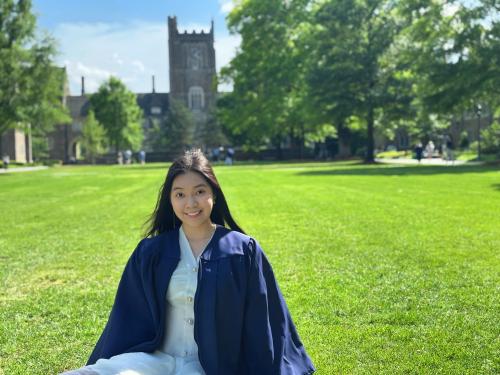
Blog
Student research profiles: Minh Hoang (Trinity, ’25)

Get to know Minh Phuong Hoang
Minh is a recent graduate of Duke University (Trinity, ’25) who completed a B.S. in economics with a finance concentration, a minor in computer science, and a certificate from the Markets and Management program. An international student from Hanoi-Vietnam, Minh is very passionate about development economics and particularly Vietnam’s development!
Awards/Honors
- Baldwin Scholar
- Distinction in Economics
- Economics Honors Student
Some of Minh’s international activities include participating in three “Duke In” programs: Duke in New York; Duke in Aix-en-Provence; and Duke in Oxford. Minh also experienced a summer study abroad at University of Tokyo, the Collegiate Immersion Bootcamp in Jiangsu, China (hosted by DKU and the Chinese government), and served as the vice president of Duke-UNICEF.
From research to thesis
Foreign direct investment (FDI) has long been known as a vital driver of economic growth in many developing countries by providing capital boosts, generating employment, and introducing advanced technology. For her senior thesis project, Minh focused on a more long-term economic impact of FDI—the productivity spillover effect—using the specific case of Vietnam.
With support from APSI’s grant for undergraduate summer research, in the summer of 2024, Minh traveled to Vietnam to investigate how foreign direct investment impacts domestic productivity in one of the most dynamic emerging economies in global trade and a model for export-led growth in Asia. Minh’s aim for this project was to contribute to our understanding of Vietnam’s strategic FDI policy-making to foster technological advancement, strengthen global economic integration, and maximize the benefits of foreign investment—a critical priority for the country amidst the rapidly changing global trade landscape.
Why study Vietnam?
Vietnam makes a fascinating case study for three reasons. First, while it stands out as a dynamic growth story in the Southeast Asia region, unlike the Asian Tigers that have relatively matured in their development trajectories, Vietnam is still in its pivotal stage — a “sweet spot” that provides a rich ground for observing technological progress and industrial transition. Second, Vietnam’s significant dependence on FDI and attractiveness to foreign investors are noteworthy. In 2023, FDI accounted for 4.3% of Vietnam's GDP, a comparatively high figure compared to the world’s average of 0.7% (World Bank, 2025). Third, Vietnam is currently navigating an unprecedented influx of high-tech foreign investment as the US - China trade war intensifies. This, she argues, makes her research questions more relevant and necessary.
Overall, the study aims to present a comprehensive picture of the dynamic between FDI and domestic productivity, thereby offering insights into how foreign investment can shape Vietnam's economic landscape. This research can help inform Vietnam’s strategic FDI policies to foster technological advancement and strengthen its global economic integration, which has become a critical priority as the country navigates an unprecedented influx of high-tech foreign investment spurred by the ongoing US-China trade war.
The process of data collection and the art of the interview
Using firm-level data from the Vietnam’s Enterprise Survey from 2013 to 2022, Minh looked at the performance of businesses in 11 provinces: Hanoi, Ho Chi Minh City, Hai Phong, Bac Ninh, Bac Giang, Vinh Phuc, Hung Yen, Dong Nai, Ba Ria - Vung Tau, Binh Duong, and Long An. The purpose of this regionally-based analysis was to investigate 1) how foreign presence affects the productivity of firms in the region, and 2) how engagement in international activity further boosts firms’ productivity.
Minh worked with the General Statistics Office of Vietnam to prepare and refine raw data for analysis. She also used her time in-country to conduct informal interviews with researchers, economic journalists, and government officials to gather insights on FDI trends and institutional perspectives. Some highlights from her in-country experience included working with officials at the Foreign Investment Agency (part of the Ministry of Planning and Investment), Prof. Dr. Sc. Nguyen Mai (Chairman) and staff at the Vietnam Association of Foreign-Invested Enterprises, and Dr. Nguyen Anh Tuan (former Editor-in-Chief) and editorial staff at Vietnam Investment Review, a publication officially affiliated with the Ministry of Planning and Investment.
The results + policy recommendations
Minh's study finds that higher levels of foreign presence within a province are strongly associated with productivity gains for both domestic and foreign firms, with domestic firms experiencing more substantial benefits, likely through different mechanisms. Moreover, Vietnam’s FDI landscape is increasingly shifting toward high-tech industries and renewable energy, as the country continues to attract major investments from global players like Korea, Japan, Taiwan, and the US. This trend marks Vietnam’s emergence as Southeast Asia’s next tech innovation hub and paves the way for further high-tech investment.
Vietnam should prioritize upgrading its power infrastructure, refining its foreign investment incentives, and strengthening intellectual property protections to build a more stable and innovation-friendly environment. Aligning FDI with sustainable development goals is also essential by promoting resource-efficient technologies, enforcing stricter environmental regulations, and discouraging pollution-heavy investments. Human capital development remains critical as well; expanding STEM education, vocational training, and industry-academia partnerships will ensure the domestic workforce can meet the demands of advanced industries. Finally, to protect its global reputation and long-term growth, Vietnam must address risks of trade rerouting through stronger customs enforcement, supply chain traceability, and diplomatic engagement with key trading partners.

Beyond Duke
Following her graduation, Minh plans to apply her knowledge of finance and development in a new direction by joining the investment team at DUMAC, Inc., a separate nonprofit support corporation founded to manage Duke’s investments. The ogranization advances the university’s operations and helps grow its resources for future generations.